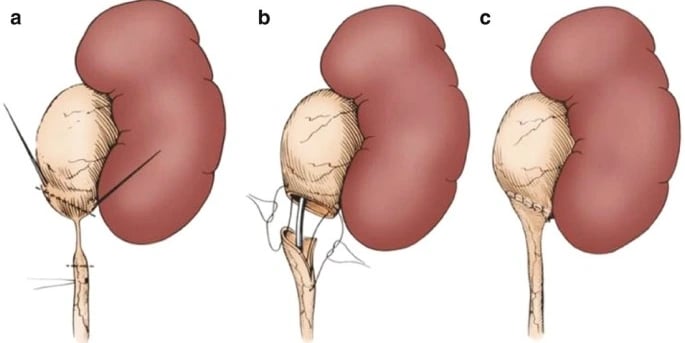🧾 Understanding Pyeloplasty
(Surgery to Fix a Blocked Kidney Drainage)


🩺 What is Pyeloplasty?
Pyeloplasty is a surgery to repair a blockage in the area where the kidney connects to the ureter (called the ureteropelvic junction, or UPJ). This blockage can stop urine from flowing freely, causing pain, infections, or kidney damage.
📍 Why is it Done?
Pyeloplasty is done to treat:
Ureteropelvic junction (UPJ) obstruction
Hydronephrosis (swelling of the kidney due to urine buildup)
Recurring urinary tract infections (UTIs)
Flank pain or discomfort
👶👨⚕️ Who Needs Pyeloplasty?
🧬 Babies and Children
About 1 in every 1,500 babies is born with a blockage where the kidney drains into the ureter — this is called a UPJ (ureteropelvic junction) obstruction.
Many mild cases improve on their own. But if the condition doesn't get better by 18 months, your child may need pyeloplasty to fix the blockage and protect kidney function.
👦👧 Older Kids, Teens, and Adults
UPJ obstruction can also develop later in life, often due to:
Scar tissue
Kidney stones
Blood vessels pressing on the ureter
Symptoms might include:
Pain in the side or back (flank)
Infections
Hydronephrosis (swollen kidney)
Imaging tests like ultrasound or CT scan can help detect it.
🛌 What Happens After Pyeloplasty?
A step-by-step guide to recovery, benefits, and risks
🏥 Immediately After Surgery (In the Hospital)
You may stay in the hospital for 1–2 days. During this time:
🍽️ You can eat and drink normally after the operation.
🚶 You’ll be encouraged to get up and walk — but follow activity limits.
💊 You may receive antibiotics to prevent infection.
🧪 A urinary drain (catheter) may be placed temporarily to help you pee.
😣 You might feel:
Mild pain or cramping
Bladder spasms
Swelling in the ureter
Pain medications are given by mouth, injection, or IV as needed.
✅ Benefits of Pyeloplasty
✨ Relief from pain
🚿 Improved urine drainage
💪 Better kidney function
💧 Reduced kidney swelling (hydronephrosis)
⚠️ Possible Risks or Complications
As Dr. Yasir Suggested like all surgeries, pyeloplasty has some risks:
❗ Reaction to anesthesia
💉 Bleeding (may require blood transfusion)
⚙️ Injury to nearby organs (bladder, blood vessels, intestines)
🧫 Infection or abscess
💢 Scar tissue (may cause blockage again)
💦 Urine leak at the surgery site
🧵 Hernia at incision site
🔁 Rare need for repeat surgery
🩸 Blood clots
🛠️ How is Pyeloplasty Surgery Performed?
(Step-by-step guide for patients)
Pyeloplasty is a surgery that removes a blockage at the point where the kidney connects to the ureter (called the ureteropelvic junction or UPJ). The goal is to restore the normal flow of urine.
Your urologist may perform the surgery using one of the following methods:
1️⃣ Open Pyeloplasty
A single large cut (incision) is made in the side or abdomen.
The surgeon removes the blocked section of the ureter.
The ureter is reconnected to the kidney in a better position.
A temporary stent (a soft tube) may be placed to help urine drain while healing.
🕒 Recovery: 4–6 weeks
✅ Often used in young children or complex cases
2️⃣ Laparoscopic Pyeloplasty
(Also called “keyhole surgery”)
Several small incisions are made in the belly.
A camera and fine instruments are inserted through these cuts.
The blockage is removed, and the ureter is reattached like in open surgery.
A stent may be placed inside temporarily.
🕒 Recovery: 2–3 weeks
✅ Less pain, quicker recovery, smaller scars
3️⃣ Robotic-Assisted Pyeloplasty
Similar to laparoscopic, but robotic arms are used for more precise movements.
The surgeon operates from a computer console using high-definition 3D vision.
Ideal for delicate or complex repairs.
🕒 Recovery: 1–3 weeks
✅ Highly precise, especially effective in children and re-do surgeries
➕ Additional Notes
Surgery is done under general anesthesia (you will be asleep).
A drain or catheter may be placed temporarily.
The stent is usually removed 2–6 weeks after surgery in a clinic visit.
🧠 In Simple Words:
“The surgeon removes the blockage where your kidney drains into the ureter, then reconnects everything so urine can flow smoothly again.”
Patient Feedback
Read what our satisfied patients say about Dr. Yasir Iqbal Lone.
Dr. Lone provided exceptional care during my surgery. Highly recommend his services!
John Smith
New Delhi
I am thoroughly impressed with Dr. Lone's expertise and caring nature. His staff is friendly, and I felt well taken care of throughout my treatment journey.
Emily Clark
Delhi NCR
